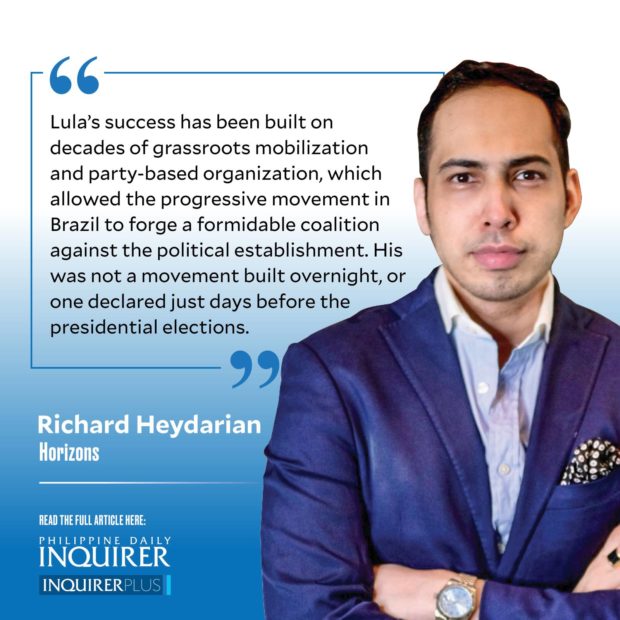Brazil elections: Lessons for our opposition
King of Fake News.” That’s how Luis Inacio Lula da Silva, affectionately known as “Lula,” described his rival, Jair Bolsonaro, in a heated presidential debate earlier this month. After all, the outgoing Brazilian president has been notorious for his fantastical claims and populist antics, which took a particularly ugly turn at the height of the COVID-19 pandemic and, unsurprisingly, in the run-up to his reelection bid. At one point, things got so problematic that Brazil’s federal police called on the country’s Supreme Court to charge Bolsonaro for spreading disinformation online.
During the election proper, disinformation reached a fever pitch with both sides making sensational and unfounded claims against each other: one side was falsely accused of satanism and another of cannibalism.
Article continues after this advertisementIn response, Alexandre de Moraes, head of Brazil’s Superior Electoral Court, ordered social media companies to clamp down on election-related disinformation. Back in March, Brazil’s national electoral authority temporarily suspended the messaging app Telegram over disinformation concerns.
The crisis of disinformation is particularly acute in Brazil. In the 2017 Ipsos Perils of Perception report, the Latin American country ended up at the bottom of global rankings along with South Africa and the Philippines in terms of public misinformation on vital policy issues. A recent report by Reuters Institute for the Study of Journalism, meanwhile, showed that two-thirds of Brazilians identified disinformation as a serious issue on all major social media platforms.
Aside from the cesspool of disinformation, the progressive forces in the country also have had to grapple with, as historian Perry Anderson chronicles in “Brazil Apart” (2019), extremely high levels of socioeconomic inequality, corruption-infested traditional politics, and outright political violence. The parallels with besieged democracies such as the Philippines are unmistakable.
Article continues after this advertisementBy all accounts, the race ended up far closer than many expected, including yours truly, who predicted a Lula victory almost five months ago (“Pink Tide 2.0: Lesson for Leni and opposition,” 06/07/22).
Dear reader, what’s clear is that progressive opposition forces can defeat authoritarian populists with charismatic leadership, grassroots organization, and inclusive communications strategy.
The battle is far from over. Taking a page from his political idol in the north (Donald Trump), Bolsonaro is widely expected to challenge his razor-thin defeat and espouse his own version of “The Big Lie” on the election outcome. And the former Brazilian president can rely on the passionate support of millions of Brazilians, especially those from the so-called interiorzão, “the big interior,” where the constellation of conservative values, libertarian economics, and anti-globalist sentiments stand in stark contrast to Lula’s progressive agenda.
As Latin America expert Brian Winter explained in a pre-election essay, Bolsonaro will remain a major political force in the foreseeable future, since “even if Lula wins, he will find it difficult to address pressing challenges such as rising Amazon deforestation and a Brazilian economy that has been shrinking or stagnant for most of the past decade.”
Nevertheless, Lula, who not long ago was facing long years in jail on suspect charges, once again succeeded in winning the country’s highest office. And he now joins his so-called “Pink Tide 2.0” counterparts from Peru (Pedro Castillo) to Chile (Gabriel Boric) and Colombia (Gustavo Petro).
The lessons for the Philippines, which is grappling with similar political economy and social challenges, are crystal clear. To begin with, the success of Pink Tide 2.0 shows that having charismatic, fiery, and conviction-driven leaders is indispensable to defeating authoritarian populism. A former labor union leader who came from humble roots, Lula, in his eighth decade, survived multiple conspiracies by reactionary forces and refused to give up on his vision of a more just and democratic Brazil. Courageously, he threw his hat once again into the ring to save the future of Brazil.
Moreover, Lula’s success has been built on decades of grassroots mobilization and party-based organization, which allowed the progressive movement in Brazil to forge a formidable coalition against the political establishment. His was not a movement built overnight, or one declared just days before the presidential elections. Finally, Lula’s success should also be seen within the broader context of regional solidarity among progressive leaders in Latin America and beyond. Clearly, the combination of competent leadership, interclass solidarity, and robust coalition-building has proven to be indispensable to defeating reactionary forces.
###—###
#ColumnName
#Byline2
richard heydarian

















